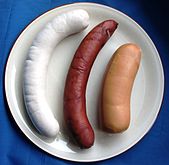Schüblig are various heavily smoked sausages made throughout the German-speaking part of Switzerland as well as the Black Forest and Lake Constance areas of southern Germany. Made of pork[4] or beef, some schüblig are classified as dry sausage, while others are cooked smoked sausage. In Eastern Switzerland, Häsch Schüblig i de Ore? (have you got schüblig in your ears?) is a common saying when someone misunderstands and can't make out what is being said.[5]

| Nutritional value per sausage | |||||
|---|---|---|---|---|---|
| Energy | 315[1] kcal (1,320 kJ) | ||||
27 g [1] | |||||
13 g [1] | |||||
| |||||
| †Percentages estimated using US recommendations for adults,[2] except for potassium, which is estimated based on expert recommendation from the National Academies.[3] | |||||
Schüblig is available in most Swiss cities.[6]
-
A St. Galler bratwurst, schüblig and cervelat, all cooked and served hot
See also
editReferences
edit- ^ a b c "Calories in Sausage Schüblig". Myfitnesspal.com. Retrieved 16 April 2015.
- ^ United States Food and Drug Administration (2024). "Daily Value on the Nutrition and Supplement Facts Labels". FDA. Archived from the original on 2024-03-27. Retrieved 2024-03-28.
- ^ National Academies of Sciences, Engineering, and Medicine; Health and Medicine Division; Food and Nutrition Board; Committee to Review the Dietary Reference Intakes for Sodium and Potassium (2019). "Chapter 4: Potassium: Dietary Reference Intakes for Adequacy". In Oria, Maria; Harrison, Meghan; Stallings, Virginia A. (eds.). Dietary Reference Intakes for Sodium and Potassium. The National Academies Collection: Reports funded by National Institutes of Health. Washington, DC: National Academies Press (US). pp. 120–121. doi:10.17226/25353. ISBN 978-0-309-48834-1. PMID 30844154. Retrieved 2024-12-05.
- ^ Berlitz: Switzerland Pocket Guide. Berlitz Pocket Guides. APA. 2012. p. 183. ISBN 978-1-78004-813-0.
- ^ "St. Gallen: History & Tradition". Swisscommunity.org. Retrieved 16 April 2015.
- ^ Fodor's Switzerland. Full-color Travel Guide. Vol. 48. Fodor's Travel Publications. 2015. ISBN 978-1-101-87872-9.
External links
edit- Media related to Schüblig at Wikimedia Commons
